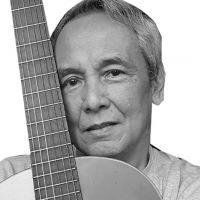Expressing oneself in an authentic way

I went to Cebu last Tuesday to attend the VisPop 2.0 songwriting contest. Together with fellow singer/songwriter Noel Cabangon, we took a flight to catch this musical event. As officers of the Filipino Society of Composers, Authors and Publishers (FILSCAP), we went to see how our partners and colleagues were doing in their second year of running this songwriting contest.
VisPop stands for Visayan Popular music. It is the region’s term for the new music that young people are writing for themselves and their generation. As a speaker in the gathering described it, prior to the recent onset of VisPop, there seemed to be only old-fashioned music that was being written with topics either about extreme sadness or funny novelty songs. And he pointed out that songs still seemed to be written in the style of their grandfathers and grandmothers. In his words, it was “music for old people.”
The night started with a sumptuous dinner at the Radisson Blu with Cebu businessmen and women who were our co-sponsors for the project. We then proceeded to the venue, which was a theater in SM.
As we entered the theater and sat down, the tiredness I was feeling seemed to disappear. In place of it, I got excited. I sensed a strong creative energy in the room. What was about to come seemed like a new magical experience. It was quite exciting for Noel and I to be there and about to witness and listen to VisPop songs and performers.
The concert began with our National Anthem sung in Cebuano. I felt a strange sensation — actually more like an epiphany — as I struggled with the lyrics flashed on the screen. As I strived to read the words, which I barely understood, I tried to substitute them with the Tagalog lyrics of Lupang Hinirang to make sense of it. In the end, I came to the conclusion that the Cebuano lyrics were probably not a literal translation of the National Anthem as I knew it.
All languages have their own words, syntax, rules, and all these most likely came into play when they translated the song into Cebuano. Languages may seem to talk about the same thing but there are many nuances at play. In the end, the way it expresses the topic brings with it its own unique syntax, color, flair and local content.
At that moment, I realized how fellow Filipinos from different regions must feel when operating in a Tagalog world. I do not wish to open up a discussion over how and why the Tagalog-based “Filipino” medium of instruction and national language came to be; I do recognize, though, that the national language as it is has made great strides in being accepted everywhere. A big part of the credit probably goes to how news has been delivered in the vernacular for the past few decades now. It has also managed to incorporate many words from other dialects all over the country. One might say that Filipino has been successful so far and is becoming a common language all over the country.
Having said that, I also realized that night that the language and culture one is born and raised in will never, ever lose its meaning, relevance and intimacy.
As the songs were sung, I felt the pride in the audience and the singers. They were expressing themselves in the lingua franca they were intimate with. I could feel the heart and soul and the meaning of the songs even if the lyrics mostly eluded my full understanding. They talked about love, superstition, compassion, loss, caution, and a host of other things using their own cultural “operating system,”
so to speak.
There were guests who sang excerpts from homegrown musicals, too. It was thrilling to watch their impressive performances. I was imbibing everything. And even if I did not understand the lyrics, I certainly felt the emotions being conveyed.
That night I felt a familiar energy, something I had first sensed when OPM in Manila was just starting. There was that feeling of adventure and recklessness, of doing something entirely new, of entering, claiming and conquering unknown territory, a boldness in expressing oneself to the world in the most direct and honest way which is through one’s native tongue. I felt the magic in what was unfolding. New possibilities and potentials were definitely unfolding. It was no less than a breakthrough.
I came home that night feeling great and I am so excited to enlist Filscap in supporting the future VisPop songwriting projects.
To songwriters in the Visayas and everywhere in the Philippines, may you express yourselves in the most honest way you can — and yes, in the language that you feel conveys your message in the most authentic way.















